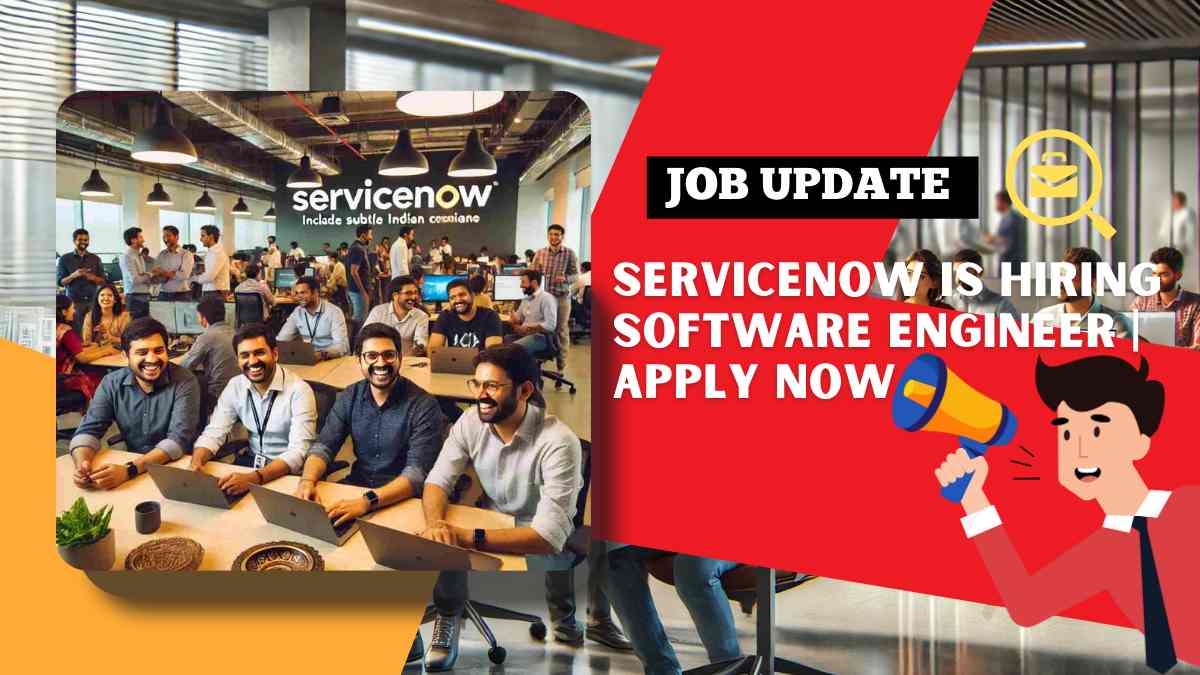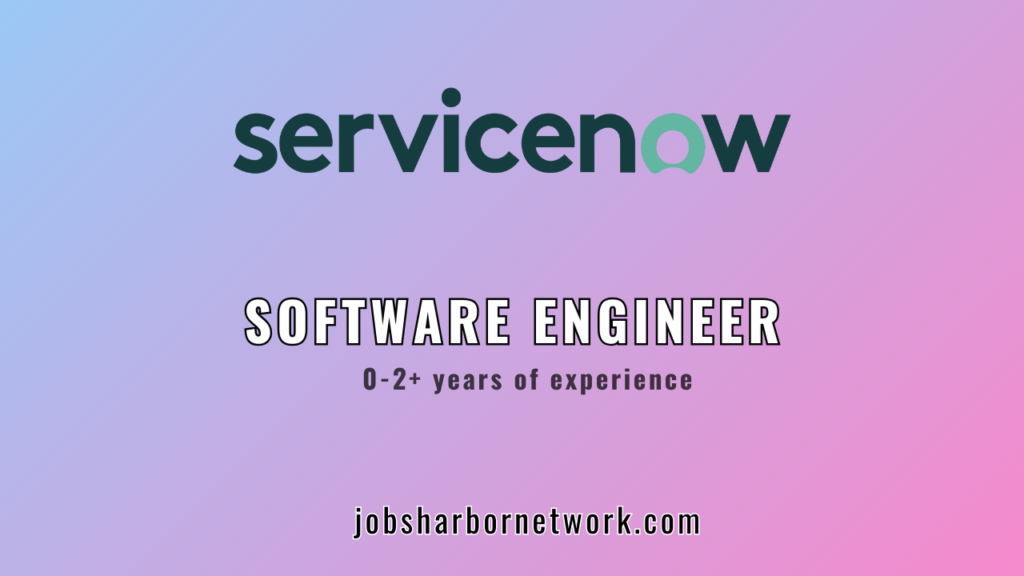In an era defined by rapid digital transformation, enterprises are constantly seeking ways to streamline operations, enhance user experiences, and drive efficiency. At the forefront of this revolution stands ServiceNow, a leading cloud-based platform that unifies various business functions into a single system of record. Behind the seamless workflows and intuitive interfaces lies a critical figure: the ServiceNow Software Engineer. Far more than just coders, these professionals are architects of digital change, leveraging the platform’s vast capabilities to solve complex business challenges and unlock new levels of productivity.
This article delves deep into the world of the ServiceNow Software Engineer, exploring their core responsibilities, essential technical and soft skills, the dynamic development ecosystem within ServiceNow, typical career paths, and the profound impact they have on modern organizations.
Understanding ServiceNow: The Platform at Hand
Before dissecting the role, it’s crucial to grasp the essence of ServiceNow. At its core, ServiceNow is a Software-as-a-Service (SaaS) platform built on a powerful cloud infrastructure. It provides a comprehensive suite of products designed to manage and automate enterprise IT, employee, and customer workflows. Key pillars include:
- IT Service Management (ITSM): The foundational offering, enabling organizations to manage IT services, incidents, problems, changes, and service requests efficiently.
- IT Business Management (ITBM): For strategic planning, portfolio management, and project execution within IT.
- HR Service Delivery (HRSD): Automating HR processes, improving employee experiences, and managing HR cases.
- Customer Service Management (CSM): Streamlining customer interactions, resolving issues, and enhancing customer satisfaction.
- Security Operations (SecOps) & Governance, Risk, and Compliance (GRC): Managing security incidents, vulnerabilities, and ensuring regulatory compliance.
What sets ServiceNow apart is its "Now Platform," which provides a low-code/no-code environment coupled with robust extensibility through scripting. It allows organizations to digitize manual processes, integrate disparate systems, and create a unified, intelligent workflow across the enterprise. This is precisely where the ServiceNow Software Engineer becomes indispensable.
The Role of a ServiceNow Software Engineer: More Than Just Code
A ServiceNow Software Engineer is a specialized developer who designs, develops, tests, and deploys solutions on the ServiceNow platform. Their work bridges the gap between business requirements and technical implementation, ensuring the platform is tailored to meet specific organizational needs while adhering to best practices.
Core Responsibilities:
- Customization and Configuration: While ServiceNow offers extensive out-of-the-box functionalities, engineers frequently configure modules, forms, lists, reports, and dashboards to align with business processes. This includes setting up new applications, service catalog items, and record producers.
- Scripting and Development: This is where the "engineer" aspect truly shines. They write client-side and server-side scripts using JavaScript (the primary language of ServiceNow) to implement complex business logic. This involves:
- Business Rules: Automating actions when records are queried, inserted, updated, or deleted.
- UI Policies & Client Scripts: Controlling form behavior, visibility, and mandatory fields on the client-side.
- Script Includes: Reusable server-side code libraries.
- Workflows & Flow Designer: Designing automated processes for various applications, defining approvals, tasks, and notifications.
- Service Portal Development: Creating custom, user-friendly portals using Angular JS, HTML, CSS, and ServiceNow’s widget framework.
- Integration: Modern enterprises rely on interconnected systems. ServiceNow Engineers are responsible for integrating the platform with third-party applications (e.g., ERP, CRM, HRIS, monitoring tools) using various methods like REST APIs, SOAP web services, and MID Servers for on-premise connections.
- Troubleshooting and Support: Diagnosing and resolving issues related to platform functionalities, custom applications, and integrations. This often requires deep analytical skills and an understanding of platform architecture.
- Performance Optimization: Ensuring that developed solutions are efficient, scalable, and do not negatively impact the platform’s performance. This involves optimizing queries, scripts, and adhering to performance best practices.
- Upgrades and Maintenance: Assisting with platform upgrades, ensuring custom code remains compatible, and managing technical debt. They are also involved in regular maintenance activities to keep the platform running smoothly.
- Documentation: Creating detailed technical documentation for custom solutions, configurations, and integrations to facilitate future maintenance and knowledge transfer.
- Collaboration: Working closely with business analysts, solution architects, project managers, and end-users to gather requirements, provide technical insights, and deliver solutions that meet business objectives.
Key Technical Skills: The Engineer’s Toolkit
A successful ServiceNow Software Engineer possesses a blend of platform-specific knowledge and general software development expertise:
- JavaScript: Absolutely paramount. Proficiency in both client-side and server-side JavaScript is non-negotiable for manipulating data, controlling UI, and implementing business logic.
- ServiceNow Platform Knowledge: In-depth understanding of the Now Platform architecture, tables, records, modules, applications, security model (ACLs), update sets, scoped applications, and development tools (ServiceNow Studio).
- API Integration: Experience with REST and SOAP web services for consuming and exposing data.
- HTML, CSS, AngularJS: Essential for Service Portal development and customizing user interfaces.
- Database Concepts: A solid understanding of relational databases, data models, and querying concepts (though often abstracted by GlideRecord).
- Version Control: Familiarity with Git or other version control systems for managing code changes.
- Debugging and Testing: Strong skills in identifying, diagnosing, and resolving technical issues, along with unit and integration testing methodologies.
- Agile/Scrum Methodologies: Many ServiceNow projects are executed using Agile frameworks, requiring familiarity with sprints, backlogs, and iterative development.
Essential Soft Skills: Beyond the Code
Technical prowess alone isn’t enough. ServiceNow Software Engineers also rely heavily on a suite of soft skills:
- Problem-Solving: The ability to analyze complex business problems and translate them into effective technical solutions on the platform.
- Analytical Thinking: Breaking down requirements, understanding system interactions, and anticipating potential issues.
- Communication: Clearly articulating technical concepts to non-technical stakeholders and effectively collaborating with team members.
- Attention to Detail: Ensuring accuracy in configuration, scripting, and documentation to prevent errors and maintain system integrity.
- Adaptability: The ServiceNow platform is constantly evolving, requiring engineers to continuously learn new features, modules, and best practices.
- Teamwork and Collaboration: Working effectively within cross-functional teams to deliver integrated solutions.
The Development Ecosystem within ServiceNow
ServiceNow provides a robust environment for developers:
- ServiceNow Studio: An integrated development environment (IDE) for building scoped applications, providing tools for creating scripts, UI pages, forms, and more.
- Update Sets & Scoped Applications: The primary mechanism for migrating configurations and customizations between instances (development, test, production). Scoped applications enforce modularity and prevent conflicts.
- Flow Designer & Workflow Editor: Tools for building and automating processes. Flow Designer, the newer, low-code alternative, is gaining prominence, offering a visual way to construct complex logic without extensive scripting.
- Service Portal: A framework for building modern, responsive self-service portals, leveraging AngularJS, custom widgets, and an API-first approach.
- MID Server: A Java application that facilitates communication between the ServiceNow instance and external applications or data sources within a private network.
Engineers must skillfully navigate these tools, understanding when to use out-of-the-box features, when to apply low-code solutions via Flow Designer, and when to delve into custom scripting for more complex requirements.
Career Path and Growth Opportunities
The demand for skilled ServiceNow professionals is consistently high, leading to diverse and rewarding career paths:
- Entry-Level: ServiceNow Administrator, Junior ServiceNow Developer, focusing on configuration, basic scripting, and support.
- Mid-Level: ServiceNow Software Engineer, Senior ServiceNow Developer, taking on more complex development, integrations, and project leadership.
- Advanced Roles:
- ServiceNow Technical Consultant: Working with clients to implement and optimize the platform.
- ServiceNow Solution Architect: Designing end-to-end ServiceNow solutions that align with business strategy.
- ServiceNow Enterprise Architect: Overseeing the entire ServiceNow landscape within a large organization, ensuring alignment with overall IT strategy.
- Lead Engineer/Team Lead: Mentoring junior developers, leading development efforts, and ensuring adherence to best practices.
Certifications play a vital role in career advancement, demonstrating expertise and commitment. Key certifications include:
- Certified System Administrator (CSA): Foundational.
- Certified Application Developer (CAD): For those focused on custom application development.
- Certified Implementation Specialist (CIS): Specializing in specific product lines (e.g., ITSM, HRSD, CSM).
Continuous learning is essential, as ServiceNow frequently releases new versions and features, requiring engineers to stay updated with the latest advancements.
Challenges and Best Practices
While rewarding, the role comes with its challenges:
- Staying Current: The platform evolves rapidly, necessitating continuous learning.
- Balancing Customization with Upgradeability: Over-customization can lead to upgrade difficulties and technical debt.
- Performance Management: Ensuring custom code does not degrade platform performance.
- Security: Developing solutions that adhere to robust security standards.
- Complex Integrations: Navigating intricate external systems and data models.
To mitigate these, ServiceNow Software Engineers follow best practices:
- Leverage Out-of-the-Box (OOTB): Always prefer OOTB functionalities over custom code when possible.
- Use Scoped Applications: Encapsulate custom development within scoped applications for better modularity, security, and upgradeability.
- Modular and Reusable Code: Write clean, well-commented, and reusable scripts (e.g., using Script Includes).
- Thorough Testing: Implement unit, integration, and user acceptance testing for all developments.
- Comprehensive Documentation: Documenting all configurations, customizations, and design decisions.
- Performance Monitoring: Regularly monitor system performance and optimize scripts and queries.
- Security by Design: Incorporate security considerations from the initial design phase.
The Impact of a ServiceNow Software Engineer
The work of a ServiceNow Software Engineer directly contributes to an organization’s bottom line and strategic goals:
- Driving Digital Transformation: They enable businesses to move away from legacy systems and manual processes to automated, digital workflows.
- Improving Efficiency and Productivity: By streamlining operations, they free up employees to focus on higher-value tasks.
- Enhancing User Experience: Creating intuitive self-service portals and efficient internal tools improves satisfaction for both employees and customers.
- Enabling Data-Driven Decisions: By centralizing data and providing robust reporting, they empower leaders to make informed decisions.
- Strategic Value: They transform IT from a cost center into a strategic partner, delivering tangible business value through innovative solutions.
Conclusion
The ServiceNow Software Engineer is a pivotal figure in today’s digital landscape. Combining a deep understanding of the ServiceNow platform with strong software engineering principles, these professionals are instrumental in designing, building, and maintaining the digital workflows that power modern enterprises. It’s a role that demands continuous learning, problem-solving prowess, and a collaborative spirit. For those passionate about enterprise technology, automation, and making a tangible impact on how organizations operate, a career as a ServiceNow Software Engineer offers a challenging, dynamic, and incredibly rewarding path forward in the ever-evolving world of digital transformation.

